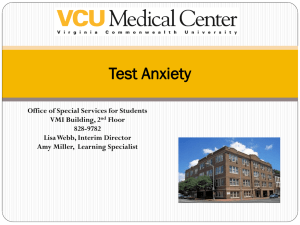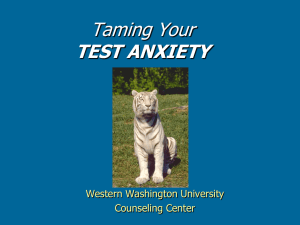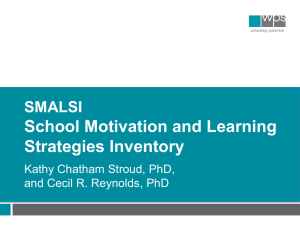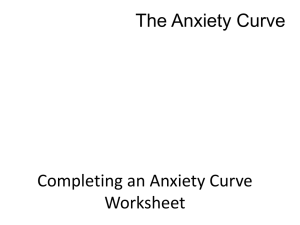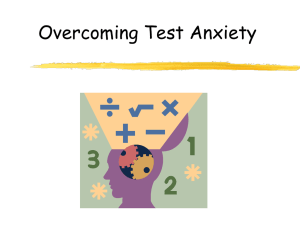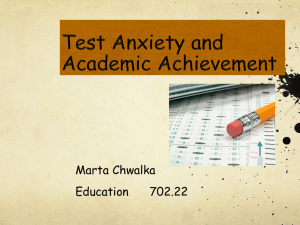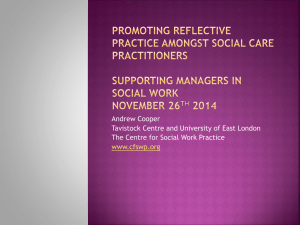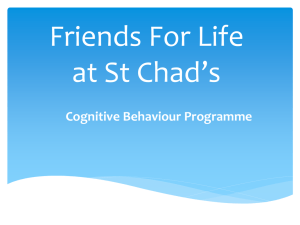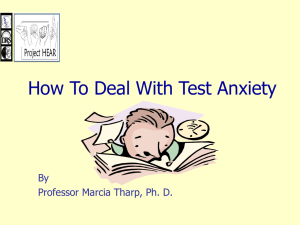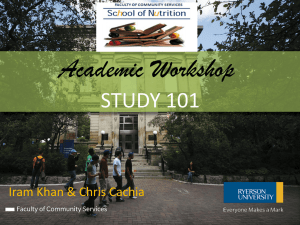Test Anxiety
advertisement
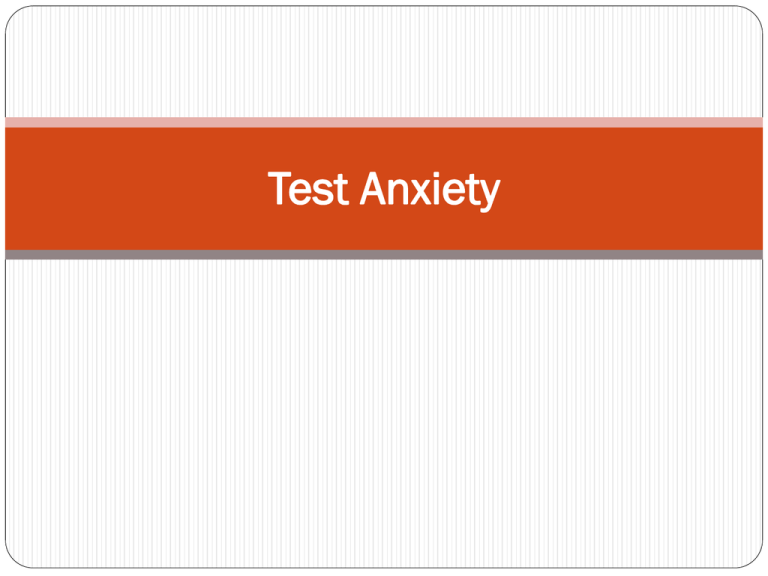
Test Anxiety What is Test Anxiety? If you experience test anxiety while taking a test you may notice the following: Mental distraction: your mind may drift while you are reading questions or writing answers, and you may have trouble concentrating on the test Physical symptoms: headaches, stomach aches, nausea, diarrhea, sweating, racing heart, shortness of breath, etc. Mental blocks: you may be unable to remember the information you studied, unable to answer the questions What Causes Test Anxiety? Previous negative experiences with tests: Students who have failed in the past may feel they will fail again Lack of preparation for the exam may cause students to “forget” the material during a test: Poor study skills, poor note-taking skills, and poor time management can lead to a false sense of confidence on a test Perfectionism: Places stress on the student to be perfect, anything less than an A is not acceptable - this is not realistic, and results in a fear of failure “If I fail this test, then I’ll fail this class, then I won’t graduate on time, I won’t get that job, and my life will be over!” Don’t “catastrophize!” Negative thinking creates anxiety. Symptoms of Test Anxiety I study hard but I get confused when I’m taking a test Study effectively: review notes daily, review notebooks weekly, make the material meaningful to you, and quiz yourself when studying. I can’t sleep before a test – then I’m exhausted and I fail Plan your time carefully: study throughout the semester, not just the night before the test, learn to relax yourself, and have good sleep habits throughout the semester. I can’t stay focused on the test – my mind wanders Take a brief break, close your eyes, tense and relax your muscles, breathing deeply, and get back to the test. If permitted, take a walk down the hall, drink some water, and get back to the test. Avoid Negative Thinking! Examples of negative thinking: “Why should I spend time studying? I never do well no matter how much I study. “ “My sister is the smart one in the family. I can’t do this.” “I can’t let my parents down.” “I always remember the answers after I turn in my test.” Negative thoughts create anxiety. Stay positive, be prepared, and encourage yourself along the way. Have a positive support system with friends and family who help you succeed. Study Effectively to Avoid Anxiety Study where you can concentrate – avoid distractions and interruptions from TV, internet, phone, family, and friends Study in the same place – keep school supplies stocked up so you don’t have to stop to look for something you need Use good lighting – straining your eyes can make them tired Use a desk or table – try not to study on a comfortable sofa or bed as it is too easy to nod off to sleep Take a nap – you will study better when you are rested Study Effectively to Avoid Anxiety Use flashcards Make charts, timelines, graphs Attend all classes, and always “be present” in class Ask questions, listen for important notes Get help, ask questions Eat well and sleep well throughout the semester Plan Effectively to Avoid Anxiety Keep notes organized Review notes soon after class, and before class, and at least once a week Keep a calendar with test dates and deadlines Schedule several short review sessions, rather than one long “cram” session Schedule some free time, to re-energize Good Test-Taking Skills For short-answer question: Budget your time: keep an eye on the clock – don’t spend too much time on one answer Do easy questions first: skip a question if you have to think about it or if it has you puzzled Look for clues in the question: words like “define” or “describe” Answer each question: even if you can not answer the question completely, write what you know – writing may spark your memory Use the full time allowed: if you finish before time is up, go back and review your test to make sure you’ve answered all the questions, fix errors or add information Good Test-Taking Skills For essay questions Read all questions first – so you can answer the “easier” questions first, and plan your time carefully Organize your ideas – make a diagram or outline on scratch paper before you start writing your essay answers Start with the easiest question – write your answers to the “easier” questions first to get them out of the way Proof read at the end – when you are done, read through you’re answers to make sure your answers make sense, and edit any errors Good Test-Taking Skills For standardized tests Get a study guide and review it daily for weeks before the exam Be realistic – there may be some questions you can not answer Make an educated guess Eliminate choices you KNOW are wrong Look for clues in remaining choices For standardized, multiple choice, matching exams Solve in the order given, some questions may relate to previous questions on the test Read each choice carefully and make sure you understand the question Think as you read – make sure understand what is being asked Narrow your choices or make an educated guess Finish the exam – keep an eye on the clock and make sure you answer all the questions Learn to Control Your Anxiety Keep your thoughts and your mood positive. “I can do this” “I’m ready for this.” “I know this.” Use your imagination in a positive way imagine yourself calm, in control, winning, etc. Use relaxation when you feel yourself becoming anxious Breathe deeply, tighten muscles and then relax them Close your eyes and imagine you are in a peaceful/happy place Close your eyes, breathe deeply, slowly, focusing on each breath Relaxation techniques can be used To help you sleep before a big day As a refresher between classes or studying To help you re-focus during a test Learn to relax Deal with Pressure Before the pressure builds and anxiety is a problem Visit VGCC counseling services: meet with a counselor to discuss your concerns (counseling at VGCC is free and confidential ) Talk to your peers: spend time talking about your problems or worries with trusted friends who have a positive influence Talk to your instructors: let them know about your concerns, check on your progress, and get advice about succeeding in class Talk to your parent, a family member, or spouse: everyone needs a support system at home to be successful in school Anxiety Isn’t All Bad Keep in mind, that some level of anxiety is actually a good thing in our lives. A little bit of anxiety, helps us get things done, do our best, reach our goals, and even avoid danger. But, when anxiety becomes overwhelming or gets in the way of our normal day-to-day activities, it can have a negative impact on our lives, at home, at work, in class, on tests, etc. Learn to manage your anxiety effectively. Learn to relax and put things in perspective. Take Steps to Beat Test Anxiety Study effectively and really learn the material Learn efficient test-taking strategies Use relaxation techniques Be prepared View our other presentations on Study Skills Note-taking Skills Time Management Stress Management Read More About Relaxation Techniques http://helpguide.org/mental/stress_relief_meditat ion_yoga_relaxation.htm http://www.webmd.com/balance/stress- management/features/blissing-out-10-relaxationtechniques-reduce-stress-spot http://www.mayoclinic.com/health/relaxation- technique/SR00007 More Information on Test Anxiety http://www.studygs.net/tstprp8.htm http://www.how-to-study.com/study- skills/en/taking-tests/47/test-anxiety/index.asp http://www.testanxietytips.com/

